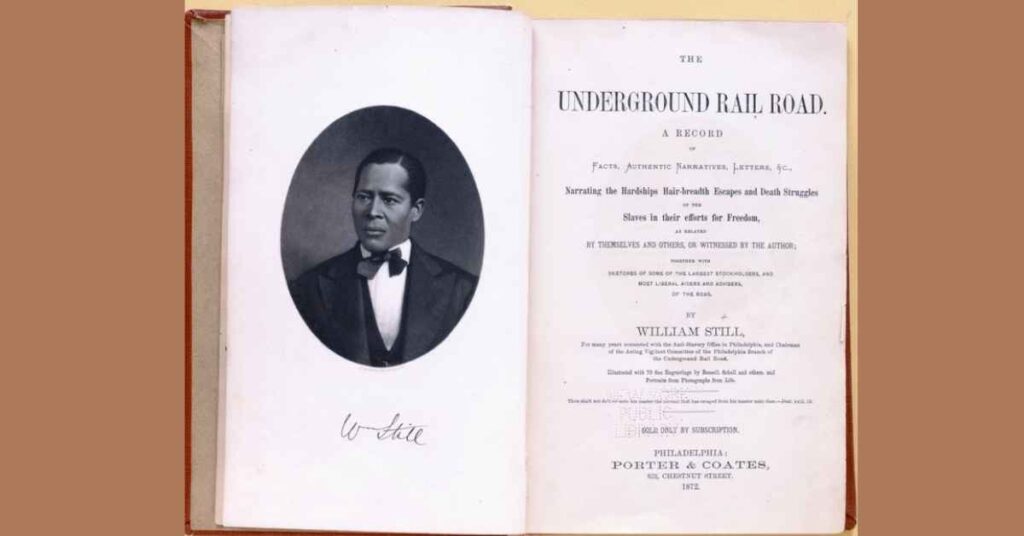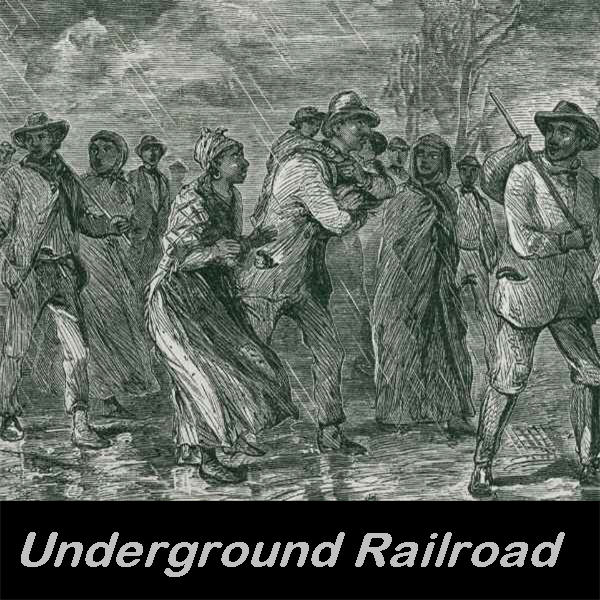This excerpt from “The Underground Railroad” by William Still records the escape of Aaron and Daffney Cornish with six of their children.
One child was an infant and wasn’t named in the book. The other children were named as:
- Solomon
- George Anthony
- Joseph
- Edward James
- Perry Lake
The family joined a larger group of fugitives traveling together from Cambridge, Maryland, and trying to reach Philadelphia.
Because fifteen fugitives had escaped a few days earlier, the journey was even more dangerous. William Still wrote that “every slave-holder and slave-catcher throughout the community were on the alert”.
The rest of this article are excerpts from Still’s book that concern the Cornish family.
[The headings and text in italics were added by the website editor. The rest is verbatim from the book. However, I have changed the order of some of the sections as I found the book presentation a little confusing.]
Excerpt From The Book – Armed For The Journey

Being aware that fifteen had left their neighborhood only a few days ahead of them, and that every slave-holder and slave-catcher throughout the community, were on the alert, and raging furiously against the inroads of the Underground Rail Road, they provided themselves with the following weapons of defense:
- three revolvers
- three double-barreled pistols
- three single-barreled pistols
- three sword-canes
- four butcher knives
- one bowie-knife
- one paw.
A paw is a weapon with iron prongs, four inches long, to be grasped with the hand and used in close encounter.
Thus, fully resolved upon freedom or death, with scarcely provisions enough for a single day, while the rain and storm was piteously descending, fathers and mothers with children in their arms (Aaron Cornish had two)—the entire party started.
Of course, their provisions gave out before they were fairly on the way, but not so with the storm. It continued to pour upon them for nearly three days.
With nothing to appease the gnawings of hunger but parched corn and a few dry crackers, wet and cold, with several of the children sick, some of their feet bare and worn, and one of the mothers with an infant in her arms, incapable of partaking of the diet, – it is impossible to imagine the ordeal they were passing.
It was enough to cause the bravest hearts to falter. But not for a moment did they allow themselves to look back.
It was exceedingly agreeable to hear even the little children testify that in the most trying hour on the road, not for a moment did they want to go back.
Reward For Aaron And Daffney Cornish
The following advertisement, taken from The Cambridge Democrat of November 4, shows how the Rev. Levi Traverse (Aaron’s owner) felt about Aaron –
$300 Reward.—Ran away from the subscriber, from the neighborhood of Town Point, on Saturday night, the 24th inst., my negro man, AARON CORNISH, about 35 years old.
He is about five feet ten inches high, black, good-looking, rather pleasant countenance, and carries himself with a confident manner.
He went off with his wife, DAFFNEY, a negro woman belonging to Reuben E. Phillips.
I will give the above reward if taken out of the county, and $200 if taken in the county; in either case to be lodged in Cambridge Jail.
October 25, 1857.
Levi D. Traverse.

Aaron’s Account Of His Owner
To fully understand the Rev. Mr. Traverse’s authority for taking the liberty he did with Aaron’s good name, it may not be amiss to give briefly a paragraph of private information from Aaron, relative to his master.
The Rev. Mr. Traverse belonged to the Methodist Church, and was described by Aaron as a “bad young man; rattle-brained; with the appearance of not having good sense, – not enough to manage the great amount of property (he had been left wealthy) in his possession.”
Aaron’s servitude commenced under this spiritual protector in May prior to the escape, immediately after the death of his old master.
His deceased master, William D. Traverse, by the way, was the father-in-law, and at the same time own uncle of Aaron’s reverend owner.
Though the young master, for marrying his own cousin and uncle’s daughter, had been for years the subject of the old gentleman’s wrath, and was not allowed to come near his house, or to entertain any reasonable hope of getting any of his father-in-law’s estate, nevertheless, scarcely had the old man breathed his last, ere the young preacher seized upon the inheritance, slaves and all; at least he claimed two-thirds, allowing for the widow one-third.
Unhesitatingly he had taken possession of all the slaves (some thirty head), and was making them feel his power to the fullest extent.
Expectations Dashed
To Aaron this increased oppression was exceedingly crushing, as he had been hoping at the death of his old master to be free.
Indeed, it was understood that the old man had his will made, and freedom provided for the slaves. But, strangely enough, at his death no will could be found.
Aaron was firmly of the conviction that the Rev. Mr. Traverse knew what became of it.
Between the widow and the son-in-law, in consequence of his aggressive steps, existed much hostility, which strongly indicated the approach of a law-suit; therefore, except by escaping, Aaron could not see the faintest hope of freedom.
Under his old master, the favor of hiring his time had been granted him. He had also been allowed by his wife’s mistress (Miss Jane Carter, of Baltimore), to have his wife and children home with him – that is, until his children would grow to the age of eight and ten years, then they would be taken away and hired out at twelve or fifteen dollars a year at first.
Her oldest boy, sixteen, hired the year he left for forty dollars.
They had had ten children; two had died, two they were compelled to leave in chains; the rest they brought away.
Not one dollar’s expense had they been to their mistress. The industrious Aaron not only had to pay his own hire, but was obliged to do enough over-work to support his large family.
Though he said he had no special complaint to make against his old master, through whom he, with the rest of the slaves, hoped to obtain freedom, Aaron, nevertheless, spoke of him as a man of violent temper, severe on his slaves, drinking hard, etc., though he was a man of wealth and stood high in the community.
One of Aaron’s brothers, and others, had been sold South by him.
It was on account of his inveterate hatred of his son-in-law, who, he declared, should never have his property (having no other heir but his niece, except his widow), that the slaves relied on his promise to free them.
Thus, in view of the facts referred to, Aaron was led to commit the unpardonable sin of running away with his wife Daffney, who, by the way, looked like a woman fully capable of taking care of herself and children, instead of having them stolen away from her, as though they were pigs.
[This is one of the rare accounts in Still’s book where fugitives were able to escape with young children. We have an excerpt of a group of eight that included a couple with an infant.]
About The Book
“The Underground Railroad” was published in 1872. The book gives the testimonies of hundreds of slaves who escaped to freedom using the network of agents and safe houses.
The author, William Still, was a black abolitionist and businessman who was a key member of the Philadelphia stop in the freedom network.
The book is in the public domain. It can be found in the Library of Congress.